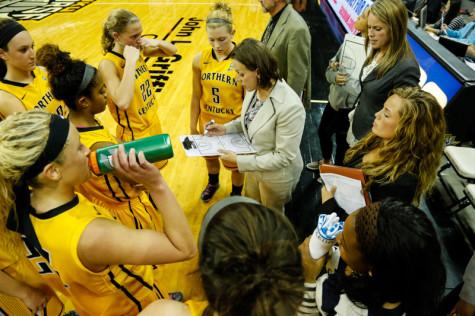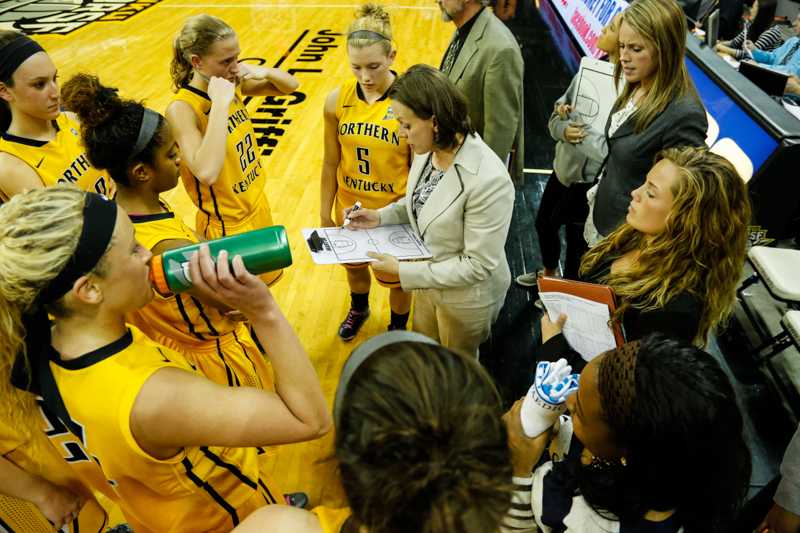Atlantic Sun eligibity rules changed in favor of NKU
NKU Women’s Basketball huddling up during NKU’s tournament win against McNeese State on March 20, 2014. The A-SUN has changed their rules allowing all schools championship eligible in 2014.
For the first time since joining Division I athletics, NKU is eligible for postseason athletic play.
For the past two years NKU hasn’t been eligible for postseason athletic play because the NCAA’s rule on Division I eligibility. Previously, NKU would have had to wait four years (until 2016) to be able to compete in postseason play.
Formerly, if NKU were to win the Atlantic Sun conference, there would not be an A-Sun team competing in the NCAA tournament. However since the NCAA changed the rules this year, if NKU were to win the A-Sun conference championships, the second place team could advance to the NCAA tournament instead.
The A-Sun Conference jumped at this chance and changed their rules, officially allowing NKU to be eligible for their first year of post-season play.
This change has made quite a buzz in the athletic department.

NKU Women’s Basketball huddling up during NKU’s tournament win against McNeese State on March 20, 2014. The A-SUN has changed their rules allowing all schools championship eligible in 2014.
“Everything I’ve heard from the coaches has been nothing but excitement,” Ken Bothof, Director of Athletics, said. “As we said, they all want to compete for championships, but again it also gives them a reason to continue to play hard throughout the season. They’ve been very excited.”
Coaches are especially thrilled at the advantage it will give them with their recruiting, especially men’s soccer head coach John Basalyga.
“The fact that now we can tell a kid we will have the opportunity to place for a post-season title…which is a big piece to the puzzle, ultimately the final piece,” Basalyga said. “So it’s a huge boost for the kids over the next couple of seasons, because I’m sure all programs have been dealing with, ‘Well you’re not eligible for the tournament.’”
Women’s basketball head coach Dawn Plitzuweit sees it as a bonus that gives her team the extra drive they need.
“A lot of time at the major level you’re building for the conference championship and we haven’t had that the first two years,” Plitzuweit said. “It really gives us a carrot at the end of the year.”
However, the women’s team did see post-season play the past two season when they were invited to the Women’s Basketball Invitational where they were eliminated in the first and second round consecutively.
The women’s team is not the only one that has competed in the post-season since NKU’s transition to Division I.
“Cross country, indoor and outdoor track & field, and tennis were originally eligible because they have individual championships in those sports,” Bothof said. “But now all of our teams will be eligible for the A-Sun championships.”
The apparent benefits of this change are also recognized by many of the student athletes.
“It makes it a lot more important for the program here at NKU, because it’s our first time being able to win a championship,” Christian Johnson, a senior defensive player on the men’s soccer team, said. “It will push the program in a direction that we all feel it can go.”
It also gives hope to other players who thought they’d never see post season play in their time at NKU.
“Personally I came to NKU thinking that I wasn’t going to be able to do anything for the first four years,” Cian McDonald, a senior midfielder on the men’s soccer team, said. “So the fact that we can at least play in the conference tournament is massive, and the fact that we’re allowed two years early is huge, so I’m not going to take that for granted.”
However, some are bothered by the fact that winning the conference doesn’t mean they can compete for a NCAA title.
“It’s bothered me for the last two years that the NCAA, which is a multibillion dollar monopoly, would do that to student athletes,” Dave Bezold, the men’s basketball head coach, said. “That’s what it’s come down to the last two years is our student athletes were not able to compete, and you want to compete in the tournaments and compete with the best, and not being able to do that is one of the most unjust, unfair things I think that you can do to those student athletes, or any competitor.”
Still, Bezold is grateful for the chance to compete in post-season play two years earlier than he thought they’d be able to.
It’s clear that the benefits reach far and wide in the athletic department. From longer seasons, wider coverage for the university to recruiting benefits, everyone is excited to see what their seasons can now bring to the university.
Your donation will support the student journalists of Northern Kentucky University. Your contribution will allow us to purchase equipment and cover our annual website hosting costs.


